
As veterans of UK and French inland waterways, we thought we knew it all: we were wrong. Dad’s Hallberg Rassy 352, Amarylla, surged about in the fierce surface currents of the first Göta Canal lock, bouncing off the other boats. Our first lock keeper after leaving Mem instructed us on the Swedish lock tying up method but we didn’t listen. By the third lock we were paying attention. On each up lock we now tied a short stern line and secured it to the iron rings on the top of the lock sides, then ran a long line from a sheet winch through a bow fairlead (we threaded ours through the centre of a cleat), before securing it as far forward as we could to keep the line taut. As the lock filled and the boat rose, we took in the slack on the sheet winch. The method required a crew member ashore but there were five of us onboard – Dad, my brother Tim, his children Arthur, 13, and Alfie, 11, and myself, plus Sandy, the dog.
Dad had sailed Amarylla from Ipswich to Denmark the previous year, cruising Denmark before overwintering the boat there. Before we sailed home, we wanted to explore the Stockholm Archipelago on the Swedish east coast, and then sail back west via the Göta Canal. This waterway is, in fact, two canals: the Trollhätte and the original Göta, connected by two large inland lakes, and many smaller ones.
The hard work transiting the locks was rewarded the second day at Söderköping, a town famous for its ice cream. The scenery beyond Söderköping was gorgeous and reminded me of rural France – meadows and mature woodlands, farms and grazing livestock. We serenely glided through the middle on a hot, cloudless day.
It was a 13-mile sail across Lake Roxen before arriving at Berg, where we were delighted to find a beach. Thankfully, the water in the lakes was a lot warmer than the Baltic.
この記事は Yachting Monthly の August 2020 版に掲載されています。
7 日間の Magzter GOLD 無料トライアルを開始して、何千もの厳選されたプレミアム ストーリー、9,000 以上の雑誌や新聞にアクセスしてください。
すでに購読者です ? サインイン
この記事は Yachting Monthly の August 2020 版に掲載されています。
7 日間の Magzter GOLD 無料トライアルを開始して、何千もの厳選されたプレミアム ストーリー、9,000 以上の雑誌や新聞にアクセスしてください。
すでに購読者です? サインイン

Midsummer on Hanö
This wonderful little island in the south-east of Sweden is a real gem off the beaten track
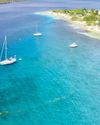
ADVENTURE SAILING TO HAITI
After spending two months in the Dominican Republic, Andy Brown sails west to Haïti bringing medical and school supplies to the town of Mole Saint Nicholas
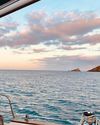
In celebration of bad sailing
New owner Monty Halls tests his sailing skills with his family aboard their Colvic 34 ketch, Sobek. A recently qualified Day Skipper, Monty faces a few unexpected challenges...

Winter brings excitement and opportunity
Oddity’s double glazing, insulation and heating create a warm, homely environment as I bash out this column.
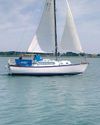
ADVENTURE MAISIE GOES TO GOES
To depart or not to depart? That is the question. Is it safer to stay, or suffer the wind and weather of a rough North Sea?

'MAYDAY, GRANDAD OVERBOARD!'
When David Richards and his grandson Henry went out racing from lowey, they didn't expect their sail to end with a lifeboat rescue
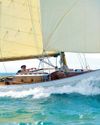
VERTUE
For a 25-footer, the Vertue has a huge reputation and has conquered every ocean. So what makes this little boat quite such an enduring success? Nic Compton finds out
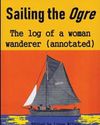
Sailing siblings
Mabel Stock, her brother Ralph, a friend Steve and an unnamed paying passenger passed through the Panama Canal in December 1919 on the sturdy Norwegian cutter Ogre. They were towed to a quiet anchorage in Balboa away from the boat traffic but within rowing distance of the shore.
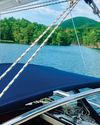
TECHNICAL MAINSAIL MODIFICATIONS
Safety and performance improved hugely when Mike Reynolds reduced the size of his mainsail and re-configured the systems controlling it
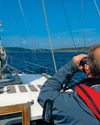
PILOTAGE DONE PROPERLY
Chartplotters are an amazing aid, but can detract from your real-world pilotage if not used with caution, says Justin Morton